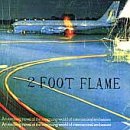| All Artists: Two Foot Flame Title: 2 Foot Flame Members Wishing: 0 Total Copies: 0 Label: Matador Records Release Date: 10/18/1995 Genres: Alternative Rock, Pop, Rock Styles: Hardcore & Punk, Indie & Lo-Fi Number of Discs: 1 SwapaCD Credits: 1 UPCs: 744861016526, 744861016519 |
Search - Two Foot Flame :: 2 Foot Flame
 | Two Foot Flame 2 Foot Flame Genres: Alternative Rock, Pop, Rock
|
Larger Image |
CD Details |
CD ReviewsNot "industrial", just industry 03/17/1999 (4 out of 5 stars) "I've been working a temp shift in a factory lately, and I've learned, with all due awe for Trent Reznor, is that industrial music is _wrong_. Oh, they've got the loudness right enough: if this job were to last a month it would do, despite my earplugs, more hearing damage to me than nine years of cautious headphone use has. But factory machines do not issue semi-melodic squiggles of clockwork-paced electrobeats. They grind away constantly, unmusically. What rhythm there is, is not for dance purposes, but a tempo-shifting array of screeches designed to tellyou, by their frequency, exactly how much pain the machine is in at the moment, and how much it is going to inflict on you as soon as it learns to stand up. Which means I have exactly one album of real industrial music in my collection: the debut of Mecca Normal's side-project 2 Foot Flame. 2 Foot Flame's sonic ingredients, like those of my worksite, are few enough that I'll give all the details you need to reproduce the songs on your own, except the bit about "how did they _do_ that?". Every song has Jean Smith's commanding voice: a little less feral than Patti Smith's, a little less blues-inflected than PJHarvey's, taking a break now and then to sound not quite as clipped and emotionless as Elastica's Justine Frischmann, but close. Instrumentation is provided by drummer Peter Jeffries and by everything-elser Michael Morley, whose own band Dead C seems like something I need to hear."Lindauer" starts the album with echoey drums in the unsteady layering of a fireworks display, and feedbacky rock guitar playing fast 3-3-2 beat measures that shift among three chords as if the guitar noise itself was a natural humming of the atmosphere that we'd somehow been brainwashed out of noticing, and as if Morley was shaping it into notes in accordance with an insectoid code. A sample of Jean's lyrics: "Parents condescended unrecognizably to him. They'd slap his wrist and bite his teeth. They just didn't take the [wee hours?] seriously". The song closes with a guitarrorist imitation of a dive-bomber landing, and "To The Sea", next, has no percussion; Jean intones long-held syllables over monotone fuzz from which rising monotone harmonics emerge like a sunrise, and behind which a clarinet provides traces of melody. "Already Waiting" has a jackboot-on-gravel stomp like a slower version of the Sex Pistols' "Holiday In The Sun", and slow, syncopated bass piano patterns with heavy sustain; a clarinet part morphs into a feedback part and back, and a minor bit of string-strangling starts out like a lost kitten "Mrrrow?"ing for help, and ends up like a lost civil defense alarm doing the same. "Mr. H", with most of the backing done by a "rat-a-tat, tat!" snare drum pattern, introduces an environmentalist theme: "Give way to the tall man, hard objects. Like a camera to the sand. Like a fish to the sea, forest but the trees, Mr. H, H, H, H, H, H, H, H, Mr. Him. Mr. concrete cutter, in-the-sand man"; her venomous vocals manage to autoharmonize compellingly without ever needing to land on any notes. "Reinvention" is just singing over slowly arpeggiated piano chords."Compass" has another 3-3-2 piano beat (that's two measures of 4/4 emphasizing the 1st, 4th, and 7th of the eight beats, if you're not clear). The guitar sounds less like feedback than the milling of a distant grumpy crowd, as Jean lectures a friend on both the cowardice and the futility of going along to get along: "Alibi, compass to your skin/ uniform of the pack, you'll never fit in/ all the [birds?] to the other side of the room. You'll never fit your legs again. You'll never fit your arms again. I'm insisting on it". "The Arbitrator"'s guitar shifts to a buzzsaw impersonation, while a half-note snare propels a chugging 2-chord riff that opens up into seriouslynonstandard 4-chord patterns now and then. Then "Cordoned Off", the next-to-last track, awes me. It constructs an eleven-minute piece out of Jean narrating her memory the aftermath of an oil spill (with intermittent reflections on human memory itself), one ominous chord held throughout, a covering of static, and intervening guitar noises in direct (though abstract) response to the story, imitating everything from a variety of heavy-duty scrubbing devices, to the downward sweep of an organ at a tense moment of a cheap video game, to the sound of metal sizzling while being strafed. On first hearing, I thought both "Wow!" and "I'llprobably never play this album much, because I'd hate to ruin this track by repetition"; but no, it holds its power over me.Finally the album winds down with "Chisel", repeating four descending piano notes, heavy on the reverb, with ceaseless aplomb as Jean asks "I can't believe in heaven but I understand the need... Can you make a chisel from the book"? I honestly suspect that, with the right sonic equipment, Mr. Morley could. I'm not sure why it would work as _music_, but I think this album very much does. It's okay, go ahead. Meow in fear if you like, but you needn't shrink away."
|

 Track Listings (9) - Disc #1
Track Listings (9) - Disc #1